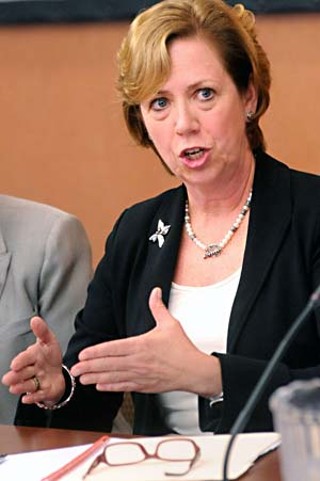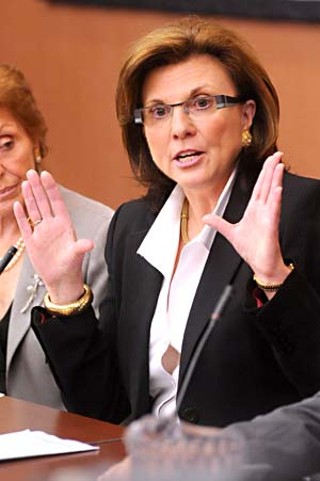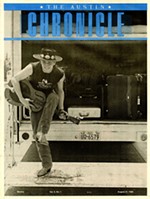Cap Metro CEO Candidates on Accessibility, Finances
Forum brings out candidates' views on agency's biggest challenges
By Lee Nichols, Fri., May 21, 2010

The two finalists for the CEO/president job at Capital Metro came to town Monday and got a taste of the full-contact sport we know as local politics. "Austin is the poster child for public engagement," said one candidate, Deborah Wathen Finn, to knowing laughter from the 100 or so gathered at IBC Bank's conference room in East Austin. "I think I'm going to write a story about this process, because I don't think that any of the other agencies have done it quite this way." That process included morning meetings with the Cap Metro board of directors, more meetings with selected stakeholder groups, and then the public forum at IBC.
Wathen Finn comes from the New York area, most recently as a private-sector consultant on transportation issues but previously in executive positions with transit systems in New Jersey and Buffalo. Her competitor for the job is Linda S. Watson, the CEO of LYNX, the transit authority for Orlando and Central Florida who previously directed Corpus Christi's public transportation and was an assistant in Fort Worth.
The meetings with the board and stakeholders were held behind closed doors, but at the public forum, the pair got an earful. Some questions predictably were the impossible-to-answer variety ("How can we trust you?") or the too-early-to-answer (about specific plans before they even have the job). But the best ones were directed at the applicants' philosophies, and the community pressing the hardest was people with disabilities, who are angry that Cap Metro still has so many stops that are not fully accessible (especially on Airport Boulevard) and that paratransit service has been cut back, especially while the agency spent millions on a rail line that has yet to attract substantial ridership.
"Your transit trip does not begin at the bus stop," said Watson. "It's a much larger footprint, and if there are not sidewalks, accessible driveways, and things that allow people to get to the stop, then people can't use your service." That's a point the Chronicle made in "Can't Get There From Here," Jan. 22 – even if Cap Metro made all its stops compliant with the Americans With Disabilities Act, the city needs to step up and provide better sidewalk connections. How to fix that situation? "If funding is an issue," said Watson, "I know there are federal funds available from different areas that can be used for improvements like that."
Wathen Finn made it clear that she believes tweaking the system at a policy level drives overall improvements, and she applied this line of reasoning to the Airport Boulevard question. "You start to engage along corridors," she said. "If that's an area that we think is an important one that's a barrier to people with disabilities, we might make that one of the first things we look at. I get the sense that the agency has tried to be all things to all people, and not everyone can be happy.

"It goes back to making sure the guidelines are in place that address that," Wathen Finn said, answering a similar question from activist Jennifer McPhail of ADAPT of Texas. "What does the policy say? What do they currently do? And if that isn't addressed in the policy, start to raise that question."
Touched on more lightly was the much bigger question of Cap Metro's overall finances – precarious in recent years. "My very first job in transit was developing the operating and capital budget," Watson said. "So I've been through the process many times. I know what goes into every single line item to come up with a $116 million budget." Watson said she would be pleased to work with a dedicated tax stream – in Orlando, she had to go before three different county governments to ask for money.
Another thorn for Cap Metro has been labor relations. "We've been fighting for eight years here," said Bob Johnson of the bus drivers' union to Wathen Finn. "It's a waste of time with any of management."
"It feels familiar," Wathen Finn replied. "I heard the same thing in Buffalo." She detailed her efforts to boost employee morale and productivity and said one of the first things she'd do would be to meet personally with drivers.
Some key figures in these debates had mixed opinions on the candidates. Jay Wyatt, the president of the union, said he favored Watson. "Both candidates are nice people, but [Watson] has the most experience in running a transit system, because she's currently running one and she's been at more than one [agency] for long periods of time. Ms. Finn, she only ran Buffalo transit for a couple of years. ... And from my understanding, not a good rapport with the employees."
But the disability advocates favored Wathen Finn. Diane Bomar-Aleman of Cap Metro's Access Advisory Committee said, "I'm very, very biased at this point toward Deborah." She and attorney Pat Bartel complained that LYNX's accommodations for the disabled – and its committee process for dealing with such issues – were less than sterling, despite Watson's assurances that LYNX complies with the ADA.
In the audience were two figures prominent for their opposition to rail – former Travis County Commissioner Gerald Daugherty and anti-rail activist Jim Skaggs. They didn't seem particularly impressed with either. Wathen Finn "frightens me that [she comes] out of the Northeast and she sure wanted to talk about rail a lot," said Daugherty afterward. "I think rail has proven up as exactly what we thought it was going to be. It's just not going to attract that many riders." Referring to a previous CEO, Karen Rae, Daugherty said, "The thing that scares me is we had one of those Buffalo girls before." Added Skaggs: "What I heard was fundamental transit philosophy, of land-use, trains, all those things we've seen failing in many, many cities. They didn't address what I think is one of the most important issues, which is: How do you operate an agency with some people viewing it as a social service agency and some viewing it as a transportation agency? Those are two diametrically opposed objectives."
The board is reportedly hoping to make a decision by Monday, but board Chair Mike Martinez has previously said it will take as long as necessary.
Got something to say on the subject? Send a letter to the editor.










